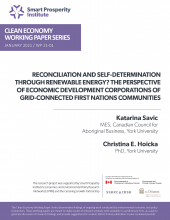By Katarina Savic and Christina Hoicka
Indigenous ownership in renewable energy projects has the ability to generate local economic development and contribute to the low-carbon energy transition. These can address the economic and climate crises we are currently experiencing. This research sought to understand how renewable energy can contribute to reconciliation and self-determination for grid-connected First Nation communities in Canada. This topic was explored through a literature review, analysis of an existing dataset of Indigenous renewable energy projects in Canada, a survey and interviews with employees of First Nations economic development corporations.
The findings indicate that partnerships and joint ventures between First Nation and non-Indigenous partners can be considered gestures of reconciliation because they honour what some participants called “the true intent of the treaties” and re-build the nation-to-nation relationship while generating own-source revenue. Reconciliation and self-determination mean decentralizing decision making over energy provision from the provincial government to the First Nation and increased energy security. For all energy and development plans by the government and industry, First Nations need to be included respectfully from the beginning. Policies that support meaningful First Nations ownership and control in renewable energy projects should be implemented and this can be achieved through the enhancement of policies and programs that have encouraged First Nations equity ownership and control of renewable energy projects on their traditional territories.
READ THE WORKING PAPER: Reconciliation and self-determination through renewable energy? The perspective of economic development corporations of grid-connected First Nations communities
The Clean Economy Working Paper Series disseminates findings of ongoing environmental and clean economy work conducted by researchers from a range of disciplines. These working papers are meant to make results of relevant scholarly work available in a preliminary form. Although these papers have not undergone a peer-review process, they meet general standards of scholarly excellence. The views expressed in these working papers are those of the authors and do not necessarily reflect the opinions of Smart Prosperity Institute.



